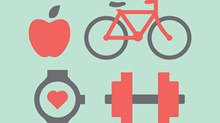What Does Your Brave Look Like?

I’m just going to be bluntly honest and admit I’m a ninny when it comes to facing fear. I’m the girl who triple checks the deadbolts at night. I once crammed myself under the bottom shelf of my hall linen closet to hide because I thought I heard a burglar in the house. There’s still that little-girl part of me that wants to cower in the corner during an especially loud thunderstorm, and I’d just rather stay off roller coasters altogether. Fear makes me want to run and hide, to avoid whatever is scaring me at all costs. It’s paralyzing and suffocating and shuts down my sensible, reasoning side. It’s miserable and frustrating and often starts a war between my head and my heart.
What fear feels like
I recently experienced an item of clothing that reminded me of what fear often feels like. I was trying to look smooth and cool under a slim-fitting skirt, so I purchased an innocent-looking product that promised to make my lines and bulges disappear. But I was immediately concerned when I encountered the instructions—detailed words of advice that led me through dos and don’ts of how to squeeze my too-big hips into this too-small material. I’m all about sophisticated accoutrements that work magic, but if you need instructions on how to put on your underwear, this could be a problem.
I stuffed. I pulled. I did everything the instructions told me, and I may have even grunted. The physics just didn’t make sense. It (being my excess girth) had to go somewhere and it wasn’t staying in like it was supposed to, nor was the hateful garment staying where it was supposed to. When I finally got it on, it stretched from my thighs to my armpits and felt like a steel suit of armor, making it hard to breathe, much less walk. I was convinced this underwear was out to get me. It was a confusing, frustrating, suffocating experience that discouraged me.
Fear can be like this. It can suffocate us, confining us until we feel trapped and frozen. It can confuse our normally rational brains, making it hard to make a decision and frustrate us to the point of doing something ridiculous (like stuffing yourself into the linen closet). It can discourage us, making us feel a bit crazy and not at all like a daughter of God.
I used to think fear was the opposite of bravery. I also used to think if you were a good Christian girl, you didn’t have fears. I don’t think this anymore. If you are alive and breathing, you will experience fear and anxiety, and it looks different for each one of us. So if you’ve got crazy fears that you wish weren’t a part of you, relax and know that those fears don’t equate to a crazy you. You can also know that God is ready to show you what your brave can look like through your fear.
What brave looks like
At MOPS International, as we prayed about our theme for the upcoming year, we began to realize that women everywhere deal with fears big and small, and yet they have a deep inner desire to be brave. I began to ask myself some questions about these two concepts. Could fear and bravery work together? What could it mean? I know from God’s Word that he doesn’t want me trapped in fear (2 Timothy 1:7), but he wants me to face it with courage (2 Chronicles 32:7). I’ve learned that God loves me too much to take away my fear. He knows that in my fear I’ll come to the end of myself and run to him. I need him, and he knows I need him. He lets me experience fear so I’ll be reminded of how small I am and how big he is. And within this, I’ll experience the profound presence of God.
I used to think courage was never quivering with fear, never holding back. I had a picture of brave that featured a woman who never shrank from hard conversations, who made difficult decisions with quick, confident decisiveness and embraced change without hesitation. I pictured a woman never overcome with anxiety and who never let it shut her down. Somewhere in my head I thought this woman should never lie in bed awake at night, letting crazy fears about her kids and husband carry her away. While I would like to think I’m making strides toward this, if I don’t always behave like this it doesn’t mean I’m not brave. Instead of asking what brave looks like, I now ask what God wants my brave to look like.
Stop pretending you're fearless
God knows me. He knows I worry and he gently calls me to not pretend around it. He calls me to come honestly, holding my fear in my hand, ready to admit it and ready to trade it in for something much better. He knows exactly what I need. It’s peace. Peace that passes all rational understanding and peace that relinquishes my need to control and change the situation all by myself. While I know these truths in my head, I still find myself trying to talk myself out of my fears and even shaming myself for them.
I’m putting my foot down in this moment and drawing a line in the sand, and I’d like to ask you to join me. I’m not pretending anymore that I’m not afraid. I’m not going to be ashamed that I struggle with anxiety and worries. Instead of pretending, I’m going to be honest about the fact that I can’t stop my mind from going there, but I’m going to invite God to join me in the lonely moments of it. We’ll sit together in it, and he will speak to my anxious heart. I’m not proud of my fear, but I know that even in it, God is proud of me.
So what does my brave look like? For me, it’s admitting to God that hard confrontations make me nervous. It’s having the boldness to ask for his Holy Spirit and presence to be with me in the anxiety and to give the words beyond my own abilities. It’s saying the name of Jesus out loud in the middle of the night when I’m worrying that my kids are okay. It’s admitting to God when I know I’m making a crazy, fear-led choice and asking him to lead me to a better way. It’s honestly admitting that I like to control things myself and once again asking for forgiveness when I forget who is really in control.
So how about you? What could your brave look like? If you’re not even sure, I understand. That’s why I wrote the book Brave Mom: Facing and Overcoming Your Real Mom Fears. It’s for real women, who are done with pretending and ready not only to face fear, but to develop strategies that work, that call on God for his big and real help. I invite you to join me.
Read more articles that highlight writing by Christian women at ChristianityToday.com/Women
 Read These Next
Read These Next

 Exercising BraveryIt’s about more than just numbers on a scale
Exercising BraveryIt’s about more than just numbers on a scale

 Seeking God's Calling for Your LifeHow to hear what he’s saying
Seeking God's Calling for Your LifeHow to hear what he’s saying








 Homepage
Homepage
